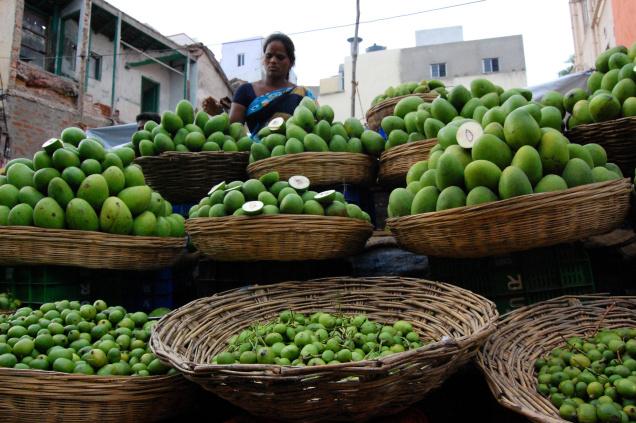PERFECT FOR PICKLING Green mangoes
Don’t get in a pickle over raw mangoes. Just pickle them
“Excuse me, where can I find raw mangoes in the market?’ I politely asked the onion-garlic seller. He shaded his eyes against the fierce sun, looked me up and down, and said: ‘Vandutaanga da, cooling glasses potindu, vadu-maanga vaangarathikku‘. Well, that cut deep; but having braved many elbow jabs and painfully-trodden toes to get to the chaotically crowded Mambalam market, I wasn’t going to let one sarcastic comment stop me. So I decided to hunt them down myself. Several terribly jostled, sweaty minutes later, I stood in front of a sack of raw mangoes. Meenakshi, who owned that shop outside door No. 8 openly laughed when I asked if I could talk to her about raw mango pickle. “But I have never made pickle in my life, though I’ve sold raw mangoes for 25 years. I buy my mango pickle from the shop.” I tell her I’m no different and ask her about her goods and customers. “Oh, first-class raw mangoes,” she says, holding out one the size of a coconut. ‘It’s from Andhra, great for pickle. People come from all over Chennai and India to buy from me; there’s just one other big raw mango shop here, so lots of mamis from West Mambalam are my regulars. Yesterday, a sackful of my raw mangoes went to Singapore. 80 kg, best quality!”
Destinations for raw mangoes
She’s rightly proud of her reputation. When I ask around, Mambalam and Mylapore markets are on everybody’s lips as ‘the’ destinations for raw mangoes and vadu maangas; nobody but the sellers mention Koyambedu. Suseela Sundaraman, a fan of both markets, has been making avakkai at home for over a decade. “The avakkai, in some ways, is the easiest pickle to make, as it involves no actual cooking. You just have to get the proportion of the salt-chilli-mustard-oil right. I follow my mother-in-law’s recipe, she always preferred hand-pounded rock-salt and chilli.” As for the vadu maanga, Suseela likes the ones from Kumbakonam. “They’re bite-sized, tiny but tasty. Madurai vadu is also lovely, very fragrant, but with vadu maanga, it’s important to choose the ones with a stalk, if not, they tend to spoil very quickly.”
Agrees Saroja Krishnamurthy, who buys her maavadu from the South Maada street market, Mylapore. “The stalked-ones are more expensive, costing Rs. 150 a kilo. Size too matters, very small ones tend to be bitter and the very large ones are insipid. It’s important to choose firm, medium-sized vadus.” The sellers, surprisingly, seem happy to indulge the finicky buyers. Susi, a raw mango and vadu maanga seller in Mylapore has a tidy mountain of fragrant raw mangoes artistically arranged on wicker trays. A middle-aged lady in salwar-kameez fusses over her purchase, choosing one from this pile, only to discard it and ask for another. Susi is patient, and even a touch amused. While they’re being cut to the buyer’s exacting specification, she tells me that her raw mangoes are as good as gold. “Good pickle mangoes should be sour and have some fibre. I should know; I’ve been selling manga for forty years. Maamis from Mylapore and all over Chennai come looking for the vadu maanga; from mid-March, they start calling me, and as soon as I get new stock, they come immediately and get it. Avakkai manga used to be an Andhra favourite, but now others are also buying it.” This year, she says, thanks to lower stocks, raw mango prices are steeper.
Making avakkai
Sarasa Krishnamurthy, who, incidentally, has just pickled raw mangoes for the year, talks about her experience of making avakkai for nearly four decades. “When we lived in a joint family, it was a big process, since we pickled 70 to 80 raw mangoes, which we cut at home using a rudimentary machine. The avakkai was preserved in large porcelain jaadis — no fridge then — with a white muslin cloth tied on the lid, to keep it airtight. But this year, my batch is made with just 5 big raw mangoes from Mambalam. For a good pickle, the manga has to be mature; it’s important to cut it with a piece of shell at the inner edge, so that the manga does not turn soft and squish into the pickle.” She then quickly gives me her recipe for avakkai, making it sound fairly straightforward. A few hours effort, I think to myself, and I too can smugly tell guests, “Oh, that’s homemade, it’s quite simple you know…”
source: http://www.TheHindu.com / Home> Arts> History & Culture / by Aparna Karthikeyan / May 03rd, 2012
